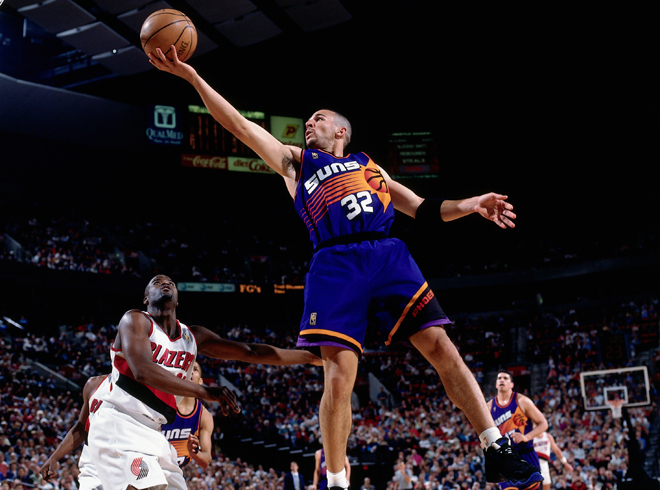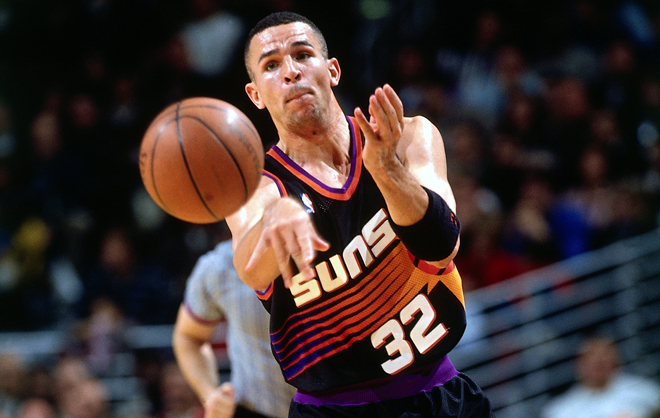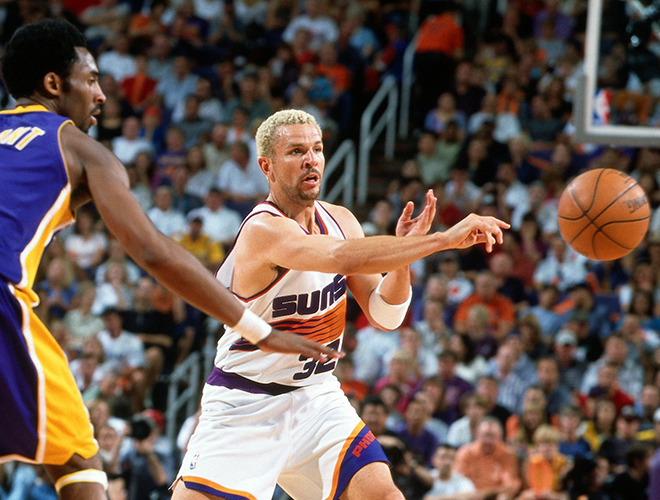The JasonKidd.com series chronicling the improvements upon Jason’s arrival with a new squad continues with a glimpse at his four-and-a-half year run in Phoenix.
After two years in college, Jason Kidd made an immediate impact upon entering the NBA with the Dallas Mavericks, helping the squad to an immediate improvement. Click here to read Driven to Improve: Dallas Pt. 1
But J-Kidd’s first stint in Big D ended abruptly during his third season Mavs when he was included in a six-player trade that sent him to his second NBA home, the Phoenix Suns.
“I didn’t have any sense I was going to be traded. I’m excited to be going to Phoenix, but I’m also sad to be leaving a lot of good friends here,” J-Kidd said after the trade.
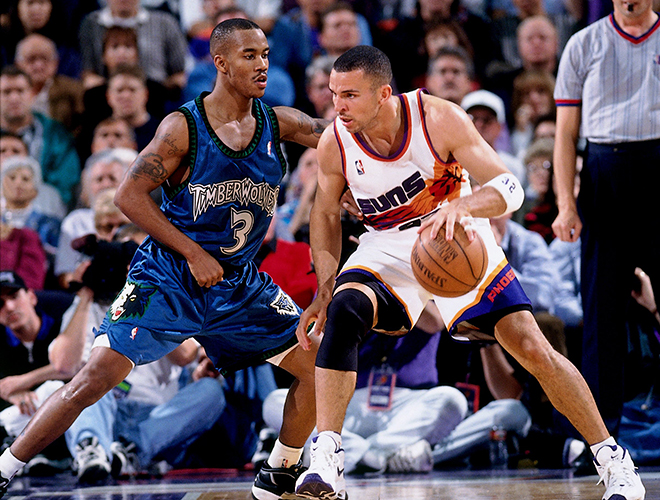
Though they’d started the season off rough, losing seven of their first nine games, the Mavs had been enjoying a bit of a resurgence at the time of the trade, including a three-game winning streak in early December. So the move left many of his Mavs teammates were bewildered.
But J-Kidd took the move in stride, looking at is as an opportunity to make his stamp on another franchise.
“(Phoenix head coach) Danny Ainge likes to get up and down, and they have a lot of basketball talent there,” Jason said of the Suns.
The move was one of many designed with the intention of bringing change to Phoenix.
The Suns were already established as a perennial playoff contender upon Jason’s arrival, but they had hit an embarrassing lull. After going just 41-41 the year before his arrival, Phoenix started the season 0-8, at which point the franchise replaced Coach Cotton Fitzsimmons with Ainge. They went on to lose their next five under Ainge to fall to 0-13, but had recently won 8 of their last 14 games at the time of the trade.
Already in the midst of an uptick, the Suns were thrilled to add a late Christmas present to the franchise — the deal was finalized the day after the holiday — and bring an elite talent into the fold.
“This is for our future. Jason Kidd is a franchise player. He’s a perennial All-Star,” Ainge said. “I think he’ll be excited with starting over fresh in a new city. If he can rekindle that fire he had in his first and second years, he’ll be a superstar.”
J-Kidd’s first few games with the Suns brought mixed results, but it wasn’t long before Ainge’s superstar prediction came true—and the turning point came when Jason returned to Dallas for the first time.
For the better part of three quarters the game was a Big D disaster. Ainge had been ejected and the Suns trailed by 27.
But backed against the wall and 15 games under .500, a new team with a new attitude was born. Phoenix rallied behind 27 points, seven assists, seven rebounds and three steals from J-Kidd, and the Suns’ new point guard dished out the game-winning assist in overtime to cap an incredible comeback over his former team.
Teammate Hot Rod Williams later deemed the victory over Dallas as a pivotal moment in Phoenix’s 96-7 season.
“I think that was the turning point,” Williams. said.
It certainly was. After that March 2 win, the Suns stayed scorching hot and finished the month at 12-3.
They carried an 11-game win streak from March into April and snuck into the playoffs as the No. 7 seed. There, they nearly knocked off No. 2 seed Seattle, but fell in five games.
But after giving one of the Western Conference’s best teams all it could handle, Phoenix was respected as a contender—and acted like one.
In 1997-98, J-Kidd’s first full season, Phoenix’s win total spiked by 16 games, and their win percentage skyrocketed from .488 to .683.
Individually, Jason became one of the league’s best players, earning either All-Star or first-team All-NBA honors in each of his four full years with the Suns.
With Jason at the helm, the Suns transformed into one of the league’s most exciting teams. In his first full year in Phoenix, No. 32 dished out 9.1 assists per game and added 11.6 points, one of eight Suns players averaging more than nine points per contest. One of those players, Jason’s backcourt-mate Rex Chapman credited Kidd with boosting the offense all-around.
“For a shooter, it’s just heaven,” Suns guard Rex Chapman said of having Kidd at the point. “There’s rarely a time I can think of in our four years together where he missed me. If I’m open, he gets me the ball.”
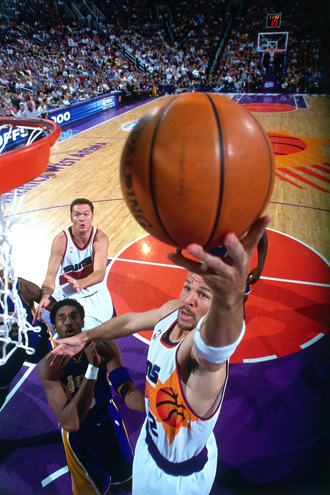 After finishing at .500 the year before Jason arrived in 1995-96 and below it in his first half season (96-97), thanks to that 0-13 start before the trade, power was restored to Phoenix in 1997-98. The Suns almost instantly returned to their status as a contender in the West.
After finishing at .500 the year before Jason arrived in 1995-96 and below it in his first half season (96-97), thanks to that 0-13 start before the trade, power was restored to Phoenix in 1997-98. The Suns almost instantly returned to their status as a contender in the West.
Phoenix won at least 50 games in all three of Jason’s 82-game seasons with the club and made the playoffs all five of his seasons in Phoenix, including the lockout shortened 98-99 season.
While repeatedly guiding the Suns to the playoffs, Jason enjoyed some fantastic individual seasons during his four-and-a-half-year run in Phoenix. He was a three-time All-Star with the Suns and led the NBA in assists per game in each of his final three years in the desert.
He also led the league in minutes during that lockout shortened 98-99 campaign, and put up then career-highs of 16.9 points, 10.8 assists and 2.3 steals per game. The nearly 11 assists per game would remain the high water mark for the remainder of his career.
After four-and-a-half successful seasons and 309 games in Phoenix, over which he averaged 14.4 points and 9.7 assists per contest, the 2001 offseason saw J-Kidd to move on to the next chapter of his career in another trade.
This time, the California Kidd was heading east to the Garden State.
